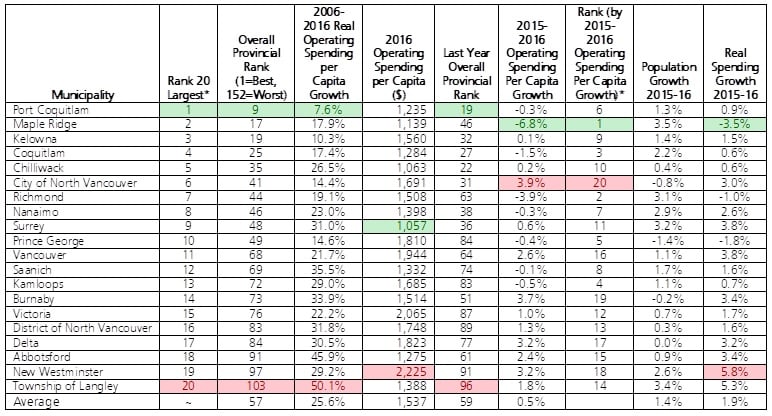CFIB provides ideas for mayors and councillors elected on Oct 20th to change course.
VANCOUVER, September 11th – The Canadian Federation of Independent Business (CFIB) today released the eleventh edition of its annual municipal spending report, which examines growth in operating spending by municipal governments. The report finds that between 2006 and 2016 overall real municipal spending in the province increased by 43 per cent– nearly four times faster than BC’s population growth of 12 per cent over that same period.
For the first time, this edition highlights best practices by some BC municipalities to save money, improve service delivery, and raise revenues in creative ways. In short, it provides a best practice guide on ways municipalities can maximize value-for-money for taxpayers.
“This week, leaders of BC’s municipal governments are in Whistler to discuss the big issues that affect municipalities. One issue not being discussed nearly enough is how municipalities spend taxpayer dollars, and whether the current spending patterns are sustainable over the long-term without big jumps in taxes and fees,” said Richard Truscott, Vice President, BC and Alberta.
The report focuses on the largest 20 municipalities, and finds the biggest cities have a lot of work to do (see Table below for a summary of the results). Out of the twenty largest municipalities, only three made it into the top twenty best performing municipalities when it comes to controlling spending growth – a disappointing result considering they account for over three-quarters of the province’s population.
“Quite simply, the spending for far too many municipal governments is on an unsustainable trajectory,” said Truscott “Over-spending drives property taxes hikes, which are already a heavy burden for small businesses and families alike. It is time for municipalities to do the responsible thing and look at ways to improve how they spend tax dollars.”
The current state of spending across BC’s municipalities leads CFIB to renew its call for municipal governments to adopt a small business platform, which emphasizes spending practices as one of the six core issues that need to be addressed.
“It is vital for candidates in this fall’s election to consider the needs of small business owners, who consistently rank municipal spending as a priority,” asserts Truscott. “Municipalities do not need to make big changes in order to save money. Small things can add up into big savings without reducing the quality of municipal operations. By replacing unsustainable practices, we can ensure the financial health of our communities and small businesses is a top priority,” concludes Truscott.
For more information, or to read the full report, please click here.
To arrange an interview with Richard Truscott, please call 604-684-5325 or email msbc@cfib.ca after 8:30 am PT. For more information, visit cfib.ca.
CFIB is Canada’s largest association of small and medium- sized businesses with 110,000 members across every sector and region, including 10,000 in B.C.


